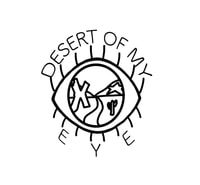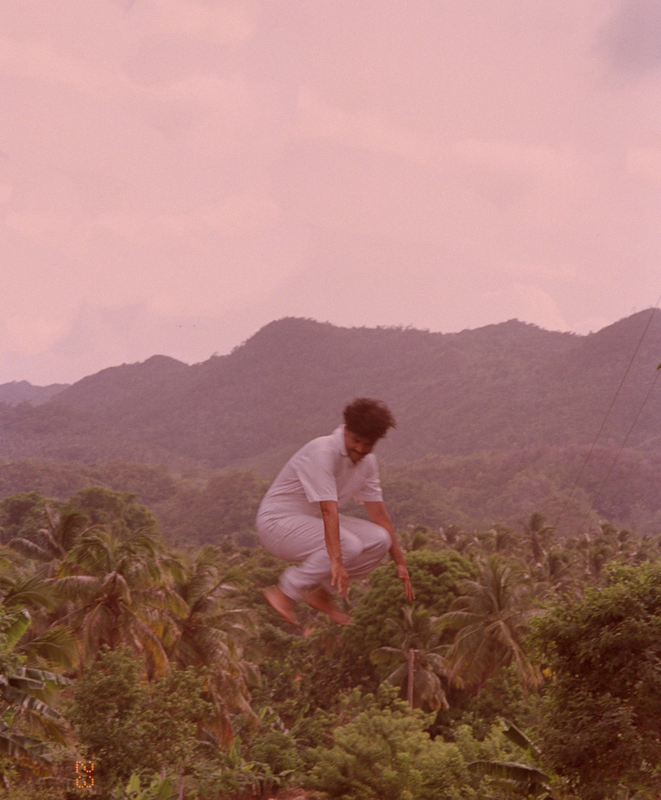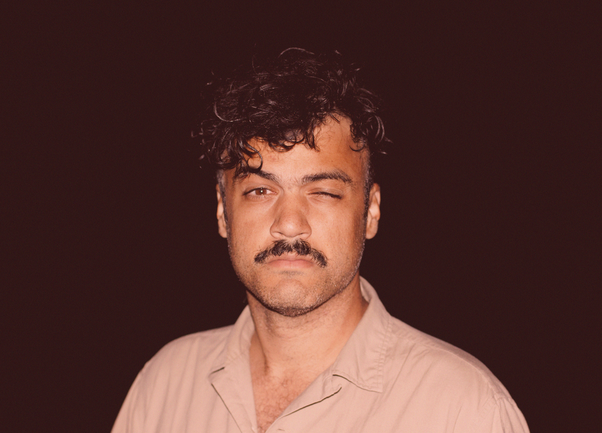"We are built to survive and we deal with worse things than someone leaving you."Tanda is Alex Ferreira's latest album. It's named Tanda "not because of the meaning of the word, but for its percussive sound: two syllables that echo hands on a drum, the cha-ka of seeds shaking in a gourd, the casual slap of bare feet on the floor, or the familiar call of a name from another room in the house." Tanda presents a fusion of warm tones that feel like a warm hug. There is a fusion of many genres and many sounds that take you on a sweet journey. Alex's vocals are great as well. It's always great to feel excited about new music, especially during this time. That is exactly what this album does. The best part of this album is that any generation can enjoy it because it is timeless. I got a chance to speak to Alex about Tanda and below is a little bit about what he had to say. Desert of my Eye: How's quarantine hoping? You know, it's wild. We've been in this for a year. Is there anything you have picked up along the way that you didn't do before quarantine? Alex: I'm trying to turn myself into a chef. I'm cooking a lot. That's my new thing. This situation has made us think about other things in life not just work, work, and work. So yeah, just trying to grow as a human being. I'm good. I actually got the virus. I don't have it anymore. I went through it. And yeah, can't complain. D.O.M.E: Well, I am glad you are well! I am assuming you didn't loose smell or taste? Alex: No, I did not. D.O.M.E: I would hope not. You mentioned doing a lot of cooking. Alex: Ha-ha. I was not cooking that week. D.O.M.E: Is there a dish you mastered or really proud of? Alex: Oh, umm, many Dominican dishes. Caribbean food. Also, things that you do in the oven. I've become an expert of the oven. D.O.M.E: Speaking of food, we do have a lentil recipe in your album. A spoken word from your mother. Is there a reason (for that)? You know, when I think of lentils... I think of my mom's "lentejas". I think of lent and many other things. Is there a reason why you chose that recipe in particular? Alex: Ever since I left the Dominican Republic, since very young, I've been traveling around. I lived in Spain and now I live in Mexico. I've always had this relationship with my mother where she would send me recipes. In some kind of way, food is that thing that takes you back home. In Tanda, it's a record where you've traveled a lot and have all these different influences that got into the record. It's a way getting back home. There's a lot of Dominican rhythms. Just as you can fuse food, you can fuse music. We are trying to do that (in this album). My mom, throughout all these years, has sent me recipes or how she does certain things. I usually listen to them and I think she has a really sweet voice and I thought it would be amazing to do something with this. Like put some music to these recipes. Tanda was the perfect album for that. In the last recipe she gives me, she recommends not to buy pre-made tomato sauce. She is recommending me to make my own tomato sauce. And in Tanda that is the whole thing. We are trying to make a record where everything sounds organic. It's not pre-made. You know, "refrito". And yeah it made sense to put that in there. D.O.M.E: I think that is wonderful. You know, I even sent the Spotify link (of the album) to my mom. She loved it. It's interesting that you mentioned that you think your mom has a sweet voice, you have a sweet and calming voice. As I was listening to the album, especially the song "No Se Rompe", that songs sounds like what I imagine warmth feels like. "Heat". Was that intentional? Some fans pointed out that it was not the "oh I'm heartbroken" song and it's more like self love and "I am over this". I don't know if you could walk me through the song and explain whether that was the feeling you were going for? Alex: That song was the hardest one to record. We went through three different versions because I was not happy with them. It started off as a calypso happy-go-lucky song and then it turned into this type of "warm song" as you describe it. I am glad you felt that because we were looking for that cause of the lyrics. The lyrics were trying to reflect the idea that in fact, the heart does not break. You know there are so many songs about heart broken things and "corazón partió" and I was trying to do the anti song of that. I was trying to say hearts don't break and time heals things and it's not bad as you think. We are built to survive and we deal with worse things than someone leaving you. At that time, we put that song out as a single because we were going through this Covid scenario and we thought that was the song in the album that reflected that sensibility and would make sense to put out. So we put that one out first. Photo by: Sebastián Cabrera Chelín D.O.M.E: Well that's wonderful. I love listen to a sad song and cry about it but it's also nice to listen to the other side of it. Do the lyrics come to you first or the melody or is it whatever comes first? Alex: It depends, whatever comes. It's so hard to write a song sometimes. You have to take them how they come. If it's the lyrics, I'll take that. If it's the melody, I'll start with that. I don't have a way of doing things. When I get bored of one type of song writing, I try something else. When I get bored of the guitar, I'll grab another instrument. It changes. It's good that it does other wise you'd be writing the same song over and over. D.O.M.E: Yeah you know this album was recorded at El Desierto (a recording studio fully known as El Desierto CasaEstudio) and it took separate sessions. Do you think the album would have been the same if it was not written during this time as compared to another time? Alex: We finished the record in February of last year. So, we finished the record before all this went down. It has that thing, you know El Desierto has a large space where we put all the musicians together and it was recorded live in a way. The musicians were playing off each other. We were trying to capture that essence like you would record in the 60s and trying to connect with that. El Desierto has a lot of windows. A lot of light went in and I think it's a record that reflects all that sunshine we had those days. That was the process we went through. D.O.M.E: That's wonderful. You know I've seen a lot of Latin artists that post there or record there. It looks magical. When I see pictures of there or Sonic Ranch, those places produce magical things naturally. Out of curiosity, do you have a favorite song on this album? Alex: It's hard because they are all important. I have to say the first one has the DNA of all he record. It was one of the first songs we recorded and it set the path for the album. Hug this idea of making a Latin record with a lot of ideas and colors. You know trying to smash things together. That first song called "Como Viene Se Va" is important in that way. D.O.M.E: I can see why you would say that about that song. It really introduces the whole thing. So my next set of questions are a bit more trivial. When I was researching you, I saw that you lived in many parts of the world. You lived in the U.S., Madrid, Mexico City. Is there a favorite place or thing you have? Or that you miss and want to do after lockdown? Alex: I miss so many things. That's the thing, if I am in one of those places, I am missing the rest. It's mostly friends, people, food. I know El Paso and Juarez really well. I actually recorded at Sonic Ranch with Ximena Sariñana and I spent months there. I really like that part of the States and Mexico. D.O.M.E: That makes me so happy. Speaking of inspiring places and things you miss, is there something that is inspiring you at the moment? Alex: I always get inspired by other records, books, and movies. Right now I am actually working on another album. I can't go on tour. I can't "defend" the record as I wish to. So right now I am writing songs. It's more of another vibe (than Tanda). That's the thing about me. I have all these influences. I wish I was one of those musicians that plays one genre because that would make my life so much easier. If I were a blues guy, I'd just do blues records. I'm a blues musician and that's. my life. I have this thing where I get inspired by people like Dylan, Silvia Rodriguez of La Fania, The Stones, music in Spain, and music in South America. So I have all things I make that don't fit together and it's my job to make them fit together. Like in Tanda we had more songs. recorded, they just didn't fit this type of Latin-American song. That when you listen to the whole album, it fits. I am trying to do these other things, this other side with my song writing (on the new album). It is closer to a singer-songwriter kind of thing. D.O.M.E: That's amazing. I am glad you are finding inspiration during this time. Another album form you is fantastic. I understand that. you are saying that if you had that one genre it would make things easier, but that is whaat makes your work very special. And of course your voice. Speaking of your voice, have you ever considered making a podcast? I feel like you would be great in a podcast. Alex: I would love to. I think I should find time for that. Especially because I like sharing music and I like talking about it. I listen to a lot of podcasts, so yeah. That's something I could do in the future. The issue is when I get into something, I really get into it. If I start doing a podcast right now, it would affect my songwriting. I would get so into it that it would complicate things. But that is a good idea. I actually thought of doing one. I told Alex that maybe he could reconsider the podcast idea once the new album is finished. He asked me what the podcast would be about and we threw around some ideas. After we discussed the podcast, I asked if there was something that he wanted to talk about. Alex brought up the fact that Tanda is available on vinyl (www.alexferreira.com). It's a limited-edition colored vinyl. The best news is that there is international shipping! Photo by: Sebastián Cabrera Chelín
1 Comment
I wanted to express my gratitude for your insightful and engaging article. Your writing is clear and easy to follow, and I appreciated the way you presented your ideas in a thoughtful and organized manner. Your analysis was both thought-provoking and well-researched, and I enjoyed the real-life examples you used to illustrate your points. Your article has provided me with a fresh perspective on the subject matter and has inspired me to think more deeply about this topic.
Reply
Leave a Reply. |
Banner by: dotdotjulio
Interviews and playlists of local bands and international artists.
Archives
April 2022
Categories
|



 RSS Feed
RSS Feed